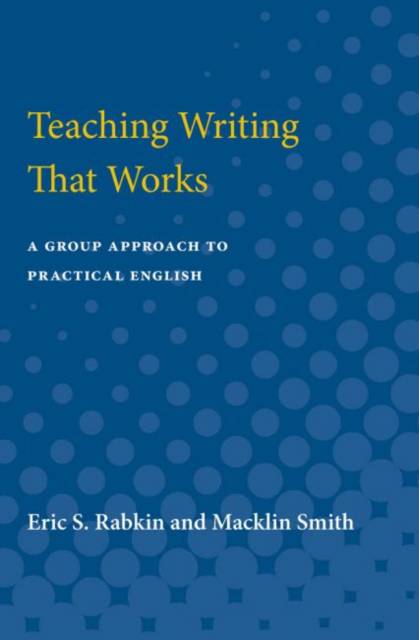
- Retrait gratuit dans votre magasin Club
- 7.000.000 titres dans notre catalogue
- Payer en toute sécurité
- Toujours un magasin près de chez vous
- Retrait gratuit dans votre magasin Club
- 7.000.0000 titres dans notre catalogue
- Payer en toute sécurité
- Toujours un magasin près de chez vous
Teaching Writing That Works
A Group Approach to Practical English
Eric S Rabkin
Livre broché | Anglais
35,95 €
+ 71 points
Description
Expressing ourselves well in written communication is important to many areas of our lives, and essential in the working world. Many courses that seek to prepare students for professional writing, however, overlook the fact that most real-world writing is produced by and for people working within groups. Teaching Writing That Works offers composition instructors an alternative to the conventional composition course in which one individual (a student) writes in isolation for another isolated individual (the teacher).The result of Rabkin and Smith's innovative, non-hierarchical approach to composition learning is Practical English, a course developed at the University of Michigan. In this successful and popular course, the choice and execution of writing tasks are the responsibility of students working together in groups rather than working alone as individuals. The crucial rhetorical issues of audience and purpose are focused by having students use their writing to do real work, both within the classroom and beyond it. The writing that evolves from this collaboration is then edited and evaluated by the group. In this emphasis on students' authority over and responsibility for the learning process, Teaching Writing That Works reflects current pedagogical concerns and philosophy.The busy teacher looking for fresh approaches for the composition classroom but with no time to develop a whole new course from the bottom up will appreciate the book's full descriptions of the Michigan course. The authors provide an outline of the curriculum and thorough explanations of teaching techniques for the course, as well as a detailed discussion of the workshop practicum and its application. Much of the practical advice and theoretical discussion can be imported into existing courses as self-contained units. Selections from students' comments on the course enhance the text and offer glimpses into the reasons for the course's popularity among students-and teachers.
Spécifications
Parties prenantes
- Auteur(s) :
- Editeur:
Contenu
- Nombre de pages :
- 218
- Langue:
- Anglais
Caractéristiques
- EAN:
- 9780472064434
- Date de parution :
- 01-01-90
- Format:
- Livre broché
- Format numérique:
- Trade paperback (VS)
- Dimensions :
- 152 mm x 229 mm
- Poids :
- 326 g

Les avis
Nous publions uniquement les avis qui respectent les conditions requises. Consultez nos conditions pour les avis.






